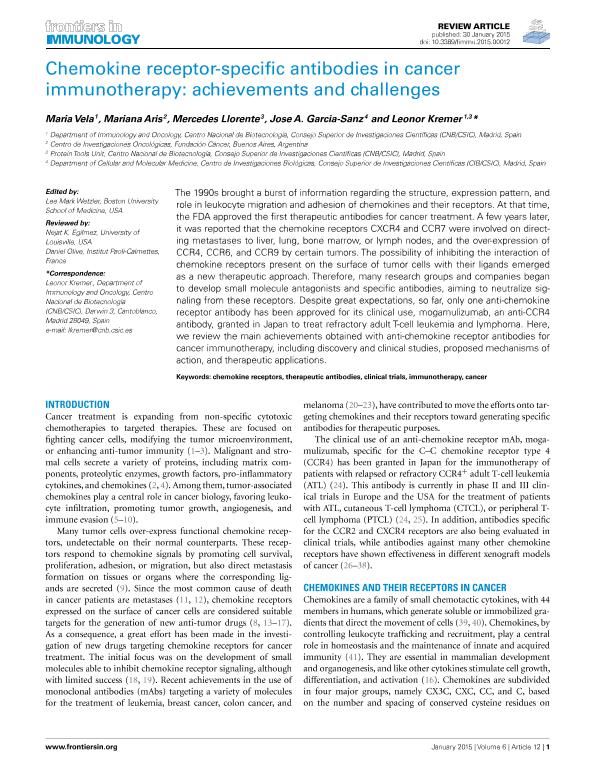Mostrar el registro sencillo del ítem
dc.contributor.author
Vela, Maria
dc.contributor.author
Aris, Mariana

dc.contributor.author
Llorente, Mercedes
dc.contributor.author
Garcia Sanz, Jose A.
dc.contributor.author
Kremer, Leonor
dc.date.available
2018-07-03T14:45:39Z
dc.date.issued
2015-01
dc.identifier.citation
Vela, Maria; Aris, Mariana; Llorente, Mercedes; Garcia Sanz, Jose A.; Kremer, Leonor; Chemokine receptor-specific antibodies in cancer immunotherapy: Achievements and challenges; Frontiers Research Foundation; Frontiers in Immunology; 6; JAN; 1-2015; 1-15
dc.identifier.issn
1664-3224
dc.identifier.uri
http://hdl.handle.net/11336/51004
dc.description.abstract
The 1990s brought a burst of information regarding the structure, expression pattern, and role in leukocyte migration and adhesion of chemokines and their receptors. At that time, the FDA approved the first therapeutic antibodies for cancer treatment. A few years later, it was reported that the chemokine receptors CXCR4 and CCR7 were involved on directing metastases to liver, lung, bone marrow, or lymph nodes, and the over-expression of CCR4, CCR6, and CCR9 by certain tumors. The possibility of inhibiting the interaction of chemokine receptors present on the surface of tumor cells with their ligands emerged as a new therapeutic approach. Therefore, many research groups and companies began to develop small molecule antagonists and specific antibodies, aiming to neutralize signaling from these receptors. Despite great expectations, so far, only one anti-chemokine receptor antibody has been approved for its clinical use, mogamulizumab, an anti-CCR4 antibody, granted in Japan to treat refractory adult T-cell leukemia and lymphoma. Here, we review the main achievements obtained with anti-chemokine receptor antibodies for cancer immunotherapy, including discovery and clinical studies, proposed mechanisms of action, and therapeutic applications.
dc.format
application/pdf
dc.language.iso
eng
dc.publisher
Frontiers Research Foundation

dc.rights
info:eu-repo/semantics/openAccess
dc.rights.uri
https://creativecommons.org/licenses/by-nc-sa/2.5/ar/
dc.subject
Cancer
dc.subject
Chemokine Receptors
dc.subject
Clinical Trials
dc.subject
Immunotherapy
dc.subject
Therapeutic Antibodies
dc.subject.classification
Inmunología

dc.subject.classification
Medicina Básica

dc.subject.classification
CIENCIAS MÉDICAS Y DE LA SALUD

dc.title
Chemokine receptor-specific antibodies in cancer immunotherapy: Achievements and challenges
dc.type
info:eu-repo/semantics/article
dc.type
info:ar-repo/semantics/artículo
dc.type
info:eu-repo/semantics/publishedVersion
dc.date.updated
2018-07-03T13:53:09Z
dc.journal.volume
6
dc.journal.number
JAN
dc.journal.pagination
1-15
dc.journal.pais
Suiza

dc.description.fil
Fil: Vela, Maria. Consejo Superior de Investigaciones Científicas. Centro Nacional de Biotecnología; España
dc.description.fil
Fil: Aris, Mariana. Fundación Cancer; Argentina. Consejo Nacional de Investigaciones Científicas y Técnicas; Argentina
dc.description.fil
Fil: Llorente, Mercedes. Consejo Superior de Investigaciones Científicas. Centro Nacional de Biotecnología; España
dc.description.fil
Fil: Garcia Sanz, Jose A.. Consejo Superior de Investigaciones Científicas. Centro Nacional de Biotecnología; España
dc.description.fil
Fil: Kremer, Leonor. Consejo Superior de Investigaciones Científicas. Centro Nacional de Biotecnología; España
dc.journal.title
Frontiers in Immunology
dc.relation.alternativeid
info:eu-repo/semantics/altIdentifier/doi/http://dx.doi.org/10.3389/fimmu.2015.00012
dc.relation.alternativeid
info:eu-repo/semantics/altIdentifier/url/https://www.frontiersin.org/articles/10.3389/fimmu.2015.00012/full
Archivos asociados
